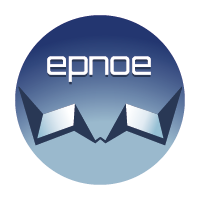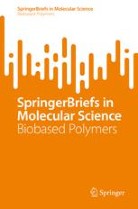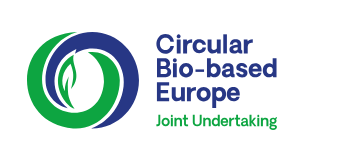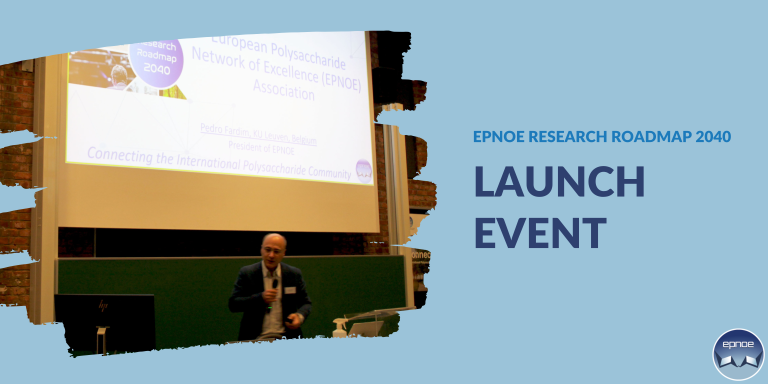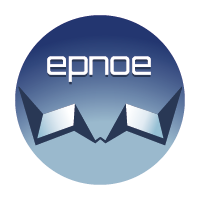News
EPNOE 2025: Call for Abstracts
The 9th edition of the EPNOE International Conference will be held from August 25 to August 28, 2025, in Sundsvall, Sweden and is organized by the FSCN Research Centre at Mid Sweden University.
The conference is organized according to the research themes in the EPNOE Research Roadmap 2040 (https://www.epnoe.eu/research-roadmap/) which was later published in Carbohydrate Polymers (https://www.sciencedirect.com/science/article/pii/S0144861723010986). The themes include related sub-topics covering various aspects of polysaccharides – ranging from fundamental research to applications and products in different fields.
The Call for Abstracts for EPNOE 2025 is now open. Please share amongst your network: https://www.epnoe2025.org/call-for-abstracts/ and we hope to meet you there!
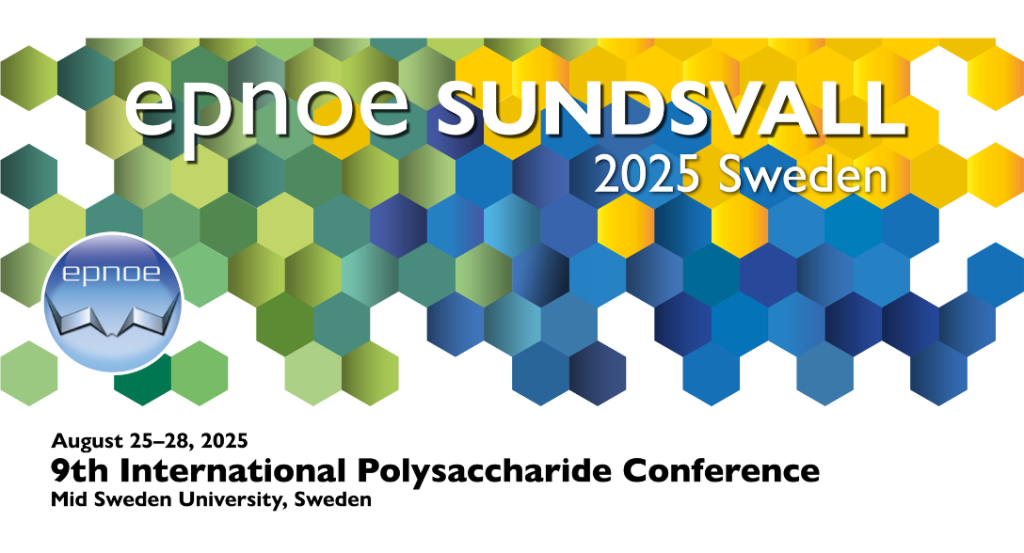
MDPI Special Issues 2025
1. MDPI polymers: ‘‘Advances in Polymer Composites for Water Treatment Applications’’. https://www.mdpi.com/journal/polymers/special_issues/2WLB5VWEJQ – Deadline for manuscript submissions: 31 March 2025
2. MDPI International Journal of Molecular Sciences: Chitosan: ‘‘Structural and Chemical Modification, Properties, and Application’’. https://www.mdpi.com/journal/ijms/special_issues/C3N9M7C4QU – Deadline for manuscript submissions: 30 June 2025
3. MDPI International Journal of Molecular Sciences: ‘’Cell Membrane Electroporation and Electroosmosis Mechanisms”. https://www.mdpi.com/journal/ijms/special_issues/HTJUA4F790?utm_campaign=ijms&utm_medium=social_journ&utm_source=facebook&fbclid=IwY2xjawIX-YBleHRuA2FlbQIxMAABHbxrvJxUompyydPPvBZ41QULQB4YHXxOQGNFK-Qp4-cu8XuwZ7BfwYwirA_aem_2VSMcYVNIZG5c7JlGmAQxw – Deadline for manuscript submissions: 30 June 2025
4. MDPI applied sciences: ‘‘Biological Control and Pesticides in Agriculture: Current Status and Applications’’. https://www.mdpi.com/journal/applsci/special_issues/70TL9X08SK – Deadline for manuscript submissions: 20 September 2025
5. MDPI polysaccharides: “New Insights into Polysaccharide-Based Scaffolds: Design, Production and Applications”. https://www.mdpi.com/journal/polysaccharides/special_issues/7O0IHTSON7 – Deadline for manuscript submissions: 30 September 2025
Meta-Analysis Antimicrobial Cellulose-Based Packaging
Researchers from the University of Girona (Assoc. Professor Marc Delgado-Aguilar, Dr. Roberto J. Aguado), a.o. have contributed to a meta-analysis to categorize antimicrobial cellulose-based packaging. They also report on type of engineered cellulose substrate, functionalization, surface properties, and mechanisms of interaction of the nanostructured system and a patent survey of research on antimicrobial cellulose-based packaging. Please find the article here: Advanced antimicrobial surfaces in cellulose-based food packaging. (2025). Advances in Colloid and Interface Science, Volume 341, July 2025, 103472. DOI: https://doi.org/10.1016/j.cis.2025.103472
Doctoral Thesis Award - Aalto University
Dr. Daniel Langerreiter was awarded with the Doctoral Thesis Award by Aalto University for his doctoral research, Synthesis of cellulose based self-sterilizing materials via solid-state reactions (October 2024).
Please find the published research here:
https://aaltodoc.aalto.fi/items/b334af28-57b8-4767-b83e-2827d112da00
Grenoble INP-UGA: Top 50 INPI 2024 Chart
Grenoble INP – UGA are in the top 50 of the INPI 2024 chart
With 53 patent applications published in 2024 by the UGA and 30 by Grenoble INP-UGA, these two institutions rose respectively to the 28th and 45th places in the ranking of the main patent applicants in France, published by the Institut national de la propriété industrielle (INPI). Historically recognized for their excellence in research and innovation, the Université Grenoble Alpes (UGA) and Grenoble INP – UGA are once again distinguished by standing alongside the largest French companies. This commitment is particularly evident in the InoPulse incubator, launched in early 2025. This strategic framework supports researchers and students entrepreneurs in the maturation and development of their technological projects, thus contributing to the exploitation of research and the creation of innovative start-ups. The press release also reports on SMEs having entered the top 50 for the first time.
10th International Day of Women and Girls in Science
|
|
SPRINGERBRIEFS IN MOLECULAR SCIENCE: BIOBASED POLYMERS
|
|
Collaborative Doctoral Partnership programme
|
|
Circular Bio-based Europe Joint Undertaking
|
|
FUTURES Special Issue Hydrogen
|
|
Heinzel-Mondi-Sappi Research Awards: Nominations until 28 February 2025
Until February 28th there is still the chance to submit a nomination for the Heinzel-Mondi-Sappi Research Award, which will be presented at the next Paper & #Biorefinery Conference (4/5 June 2025) in Graz, Austria. This award recognizes outstanding publications by young scientists that have a potentially significant positive impact on the future of the pulp and paper industry.
Further details regarding the award are available for download online: https://paper-biorefinery.com/en/hms?idU=12.
Dr. Francesco D'Acierno appointed as Assistant Professor at SMaRT, Campus Ghent
We are pleased to announce that Francesco D’Acierno has accepted a position as Assistant Professor at SMaRT (Soft Matter, Rheology and Technology KU Leuven, Department of Chemical Engineering), Campus Ghent.
Please find more information about dr. Francesco D’Acierno tenure track here: https://cit.kuleuven.be/smart/people/00164491
POLREC 2nd Networking Open Call:
Exciting opportunity for SMEs in plastics, rubber & composites!
POLREC 2nd Networking Open Call:
Exciting opportunity for SMEs in plastics, rubber & composites!
- Business/ trade fairs & exhibitions in Europe and outside Europe (Oversea)
- Conferences, conventions and forums in Europe and outside Europe (Oversea)
- Matchmaking events in Europe and outside Europe (Oversea)
MDPI: Special Issue polymers
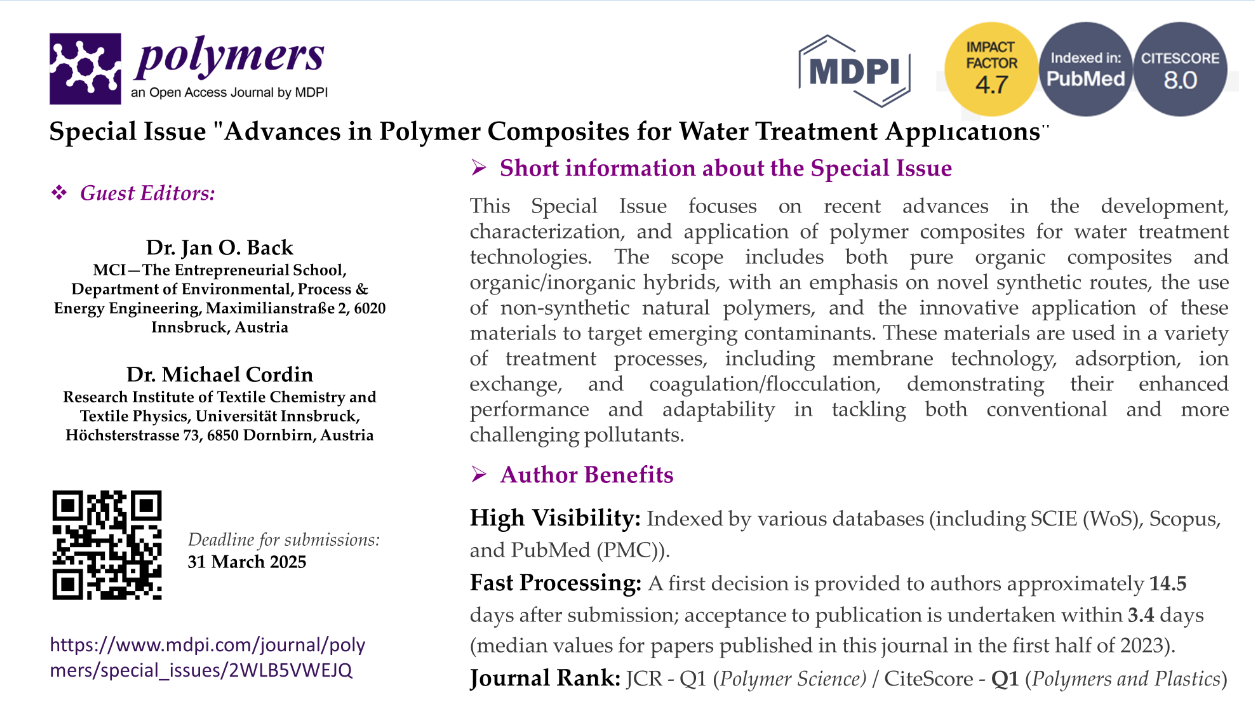
SpringerBriefs Books Donation 2024: University of Toliara
The research group led by Prof. Jean Hugues at the University of Toliara (Madagascar) has been nominated and selected for the 2024 edition of the SpringerBriefs Books Donation project, a collaborative project between EPNOE and Springer Nature. As part of this initiative, the research group will receive 20 books on bio-economy, sustainability, and gender equality.
Established in 1971, the University of Toliara is the oldest decentralised higher education center in Madagascar, achieving university status in 1988.
Prof. Jean Hugues and his team are dedicated to the valorisation and conservation of medicinal plants found in southern Madagascar, aiming to develop improved traditional medicines.
A recent survey conducted by the team in southern Madagascar identified several plants traditionally used to treat diabetes and cancer. Their current research focuses on isolating antidiabetic and anticancer molecules. Prof. Jean Hugues is particularly involved in this field, collaborating with the Transformation & Agro-Resources Unit at the University of Artois, directed by Prof. Patrick Martin.
Looking ahead, their vision includes securing a large-scale project to acquire modern equipment such as UHPLC and GC/MS, which are crucial for advancing their research.
As a public institution, the University of Toliara adheres to the “Malagasy State Gender Policy”, promoting gender equality and combating discrimination. The university has achieved significant progress in this area, with women comprising the majority of the administrative and technical staff. Among the permanent professors, there are currently 176 men and 89 women, and the university aims to further improve gender balance through ongoing efforts.
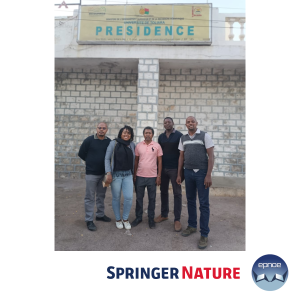
In conversation with Ana Kramar, Susana Guzman Puyol, and Joice Kaschuk
Joice Kaschuk, Ana Kramar, and Susana Guzman Puyol have recently joined forces with the EPNOE Junior Group, bringing their expertise to the group from Wageningen University & Research, and the Spanish Council for Scientific Research (CSIC).
Their research is a source of inspiration for the EPNOE community, dedicated to shaping a more sustainable and innovative future.
We sat down with them to explore further.
“What is your research about in a nutshell?”
Joice: “My research aims to produce nanomaterials from agricultural waste, employing green methods to enhance sustainability across medical, energy, and environmental applications.”
Ana: “My focus lies in spinning techniques for polysaccharide-based nano and microfiber production, geared towards designing nanomaterials for textile, biomedical, and food packaging applications.”
Susana: “I work in the production of multifunctional bioplastics from agro-food waste for food packaging applications.”
“What inspired you to join the EPNOE Junior Team?”
Joice: “I believe that by joining the EPNOE Junior Team, I can expand my network and community within the polysaccharide field, crucial for my career and development.”
Ana: “I joined the EPNOE Junior group to engage with fellow scientists in the polysaccharide community, to share experiences and ideas, and especially to foster innovation in the industrial application of polysaccharide-based materials.”
Susana: “EPNOE presents an excellent opportunity to meet new polysaccharide researchers and establish collaborations.”
“As a junior researcher, what suggestions do you have for others in your position? What would you like to share with them?”
Joice: “The scientific journey can feel lonely without a supportive community, so I highly recommend that all young researchers join EPNOE Junior activities. This amazing group will not only support your career but also become your friends, making the journey enjoyable.”
Ana: “Be passionate yet patient with your research; positive outcomes drive science and innovation forward, but consider ‘negative’ results as essential building blocks of experience and skills, often overlooked but crucial for shaping you as a scientist.”
Susana: “Being a researcher is not always easy, but this job offers the opportunity to learn something new almost every day.”
Guadalupe Vaca-Medina joins the EPNOE Junior Group
Guadalupe-Vaca Medina has recently joined the EPNOE Junior Group, a team of dedicated young scientists working on tailored activities for all EPNOE junior members.
Guadalupe currently serves as a researcher at the French National Research Institute for Agriculture, Food and Environment (INRAE). She contributes her expertise from the Laboratory of Agro-industrial Chemistry (LCA) in Toulouse, where her research focuses on exploring the role of water in the production of materials from natural polymers through innovative thermomechanical processes.
Guadalupe made the decision to join the EPNOE Junior Group motivated by a desire to foster new collaborations on a European scale and connect with like-minded individuals with complementary backgrounds and missions. The EPNOE Junior Group will have the opportunity to gain an insightful new perspective thanks to Guadalupe’s experience in the private sector.
She explained: “The main goal is to get to know people in the network with whom I can share similar missions. Furthermore, I believe that my experience in the private sector will offer a unique perspective to the team.”
Guadalupe shared an empowering message for all junior researchers, urging them to be confident in their capabilities. She added, “Often, we assume senior scientists are always right, and we tend to censor ourselves. However, history has shown us that breakthroughs occur when individuals challenge existing beliefs. Embrace the power of your ideas!”
The EPNOE Junior Group looks forward to the positive impact that Guadalupe will undoubtedly have on EPNOE junior scientists, as well as on the broader scientific community!
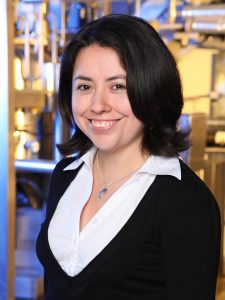
Yuanyuan Li from KTH Royal Institute of Technology has been awarded the 2023 Gunnar Sundblad Foundation's Competence Development Award
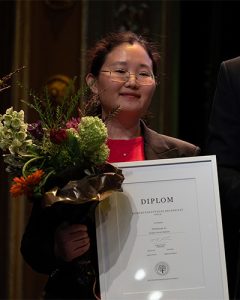
Prof. Guang Yang is the EPNOE ambassadress in China
On the wake of the desire to establish new extra-european connections and start more collaborations, the EPNOE Executive Board voted unanimously for the introduction of Prof. Guang Yang as EPNOE ambassadress in China.
Guang Yang received a PhD degree in Chemistry from Wuhan University, and she is now a professor at Huazhong University of Science and Technology (China). Her current research focuses on the development of nanocellulose-based functional materials, design and fabrication of novel nano-drug transporters, 3D printing, nano-assembly of ordered materials, and tissue engineering.
Among other things, she is serving as the Deputy Director of the Cellulose division of the Chinese Chemical Society, Deputy Director of the Stem Cell and Tissue Engineering Committee of Chinese Bioengineering Society, and as council member of several committees, including the Nanocellulose and Materials Committee of China Paper Association, the Polymer Materials Analysis Technology and Characterization Method Committee of Chinese Chemical Society, the Biomedical Polymer Materials Branch of China Biomaterials Society. She is an editorial board member of Carbohydrate Polymers, Polymers, Engineered Science, Advanced Composites and Hybrid Materials, etc.
She is Stanford University ‘s Top 2 % of Global Scientists, and has authored more than 200 publications in high impact international peer-reviewed journals (h index = 54, citations: 10681 based on Google Scholar), including Progress in Materials Science, Advanced Energy Materials, Advanced Science, Advanced Functional Materials, Biotechnology Advances, Materials Horizons, Biomaterials, ACS nano, Bioactive Materials, Nano-Micro Letters, Small, etc. She edited 3 books, authored several chapters, and registered more than 30 authorised patents.
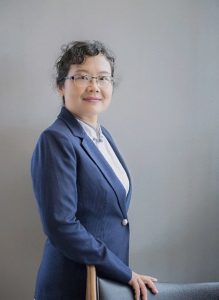
EPNOE & SpringerBriefs - Books Donation
The books donation is a noteworthy project that EPNOE is carrying out with SpringerBriefs. The aim is to donate 20 SpringerBriefs books about bio-economy, sustainability, gender equality, and other similar topics to universities in developing countries.
Upon suggestions from EPNOE members, the EPNOE Executive Board selected the following university:
- Federal University Oye-Ekiti (Nigeria)
Read here the full list of selected books.
The Federal University Oye-Ekiti (Nigeria) will receive 20 SpringerBriefs books in 2023
The Macromolecular Chemistry research group of the The Federal University Oye-Ekiti will receive 20 SpringerBriefs books in 2023. Led by Professor Olayide S. Lawal, they work in the area of value-added industrial applications of raw and modified bio-macromolecules.
The group applies both physical and chemical modifications to biopolymers with a view to enhancing applications in diverse industries such as food, pharmaceuticals, textile, medical and household products. Such chemical modifications include oxidation, acetylation, succinylation, hydroxypropylation and carboxymethylation.
The bio-polymers of interest are mainly starches, cellulose and protein isolated from plants and from different sources, particularly lesser-known underutilized plant resources with a view to bringing them to full industrial utilization. To expand the relevance of natural polymers in diverse industrial applications, recent efforts are now on the preparation and characterization of novel bio-based hydrogels for drug delivery and other relevant applications as well as modification and utilization of bio-resources such as gelatin, guar gum, chitosan, chitin, gum arabic and dextran for applications in diverse industries.
Professor Lawal received Ph.D in Industrial Chemistry from University of Ibadan, Nigeria. He was a postdoctoral fellow of Alexander von Humboldt at the Institute for Technical and Macromolecular Chemistry, University of Hamburg, in the group of Professor Werner Michael Kulicke (2006-2008). Professor Lawal recently completed another postdoctoral training as a fellow of Alexander von Humboldt Foundation at the Institute for Organic Chemistry and Macromolecular Chemistry (university of Jena, Germany) in the group of Professor Thomas Heinze (2022). He was also a fellow of the Japan Society for Promotion of Science at University of Hyogo, Japan in the group of Professor Miki Yoshimura. He is currently a fellow of Institute of Chartered Chemists of Nigeria and the Chemical Society of Nigeria.
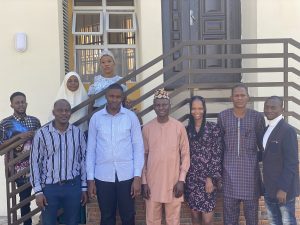
The EPNOE Research Roadmap 2040 launch event was a great success!
On Tuesday, 31 January, we launched the EPNOE Research Roadmap 2040. The event took place at the Thermotechnisch Instituut, in Heverlee (Leuven, Belgium), and it was a great success!
The 5 strategic areas that compose the EPNOE Research Roadmap have been presented by the Chairs and Co-Chairs, encouraging a necessary conversation among different stakeholders: industry, academia, policy-makers.
Throughout an insightful round-table discussion on ‘Future Perspectives of Circular Bioeconomy in Europe’ we put a spotlight on a common goal: explore all the benefits of polysaccharides’ resources for a more sustainable future. This urgent challenge needs to be tackled by multiple actors: researchers, educators, technology experts, policy-makers, and citizens.
A transformation is possible, as the EPNOE Research Roadmap 2040 Chair — Karin Stana Kleinschek — explained: “polysaccharides are very well positioned to transition from fossil-based to sustainable bio-based materials with equal or improved performances.”
Although the path is long, we have a roadmap in place!
Workshop on Drug Delivery - On the Road to Innovation!
The workshop on “Drug Delivery – On the Road to Innovation” held in Rome, on 27 and 28 October 2022 was a great success. Organised in cooperation with the La Sapienza University of Rome, the workshop was insightful and powerful, being the perfect occasion to bring together scientists involved in pharmaceutical applications of polysaccharides, thus exchanging experiences and perspectives.
All the talks, spanning form nanotechology to biohydrogels, were extremely interesting and the resulting discussions allowed all the participants to be an active part of the drug delivery community.
Check out the poster and oral abstracts of the presenters here below:
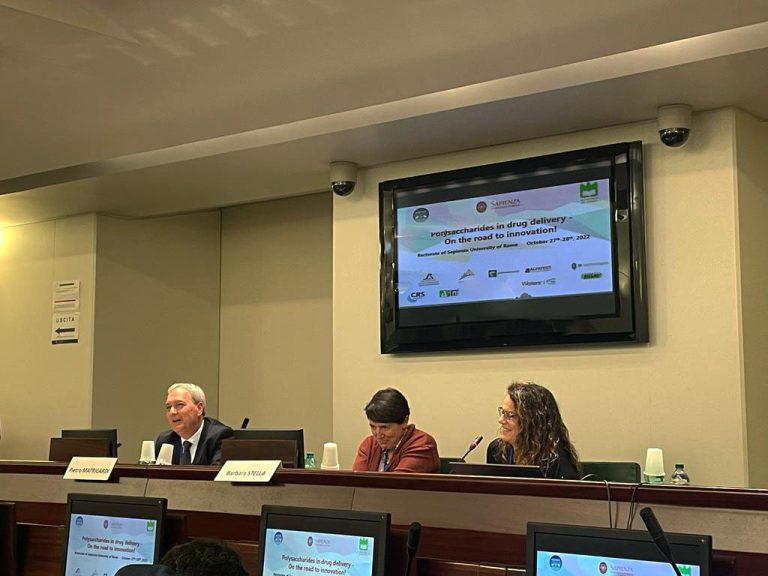
EPNOE Junior Award 2022
|
|
|
|
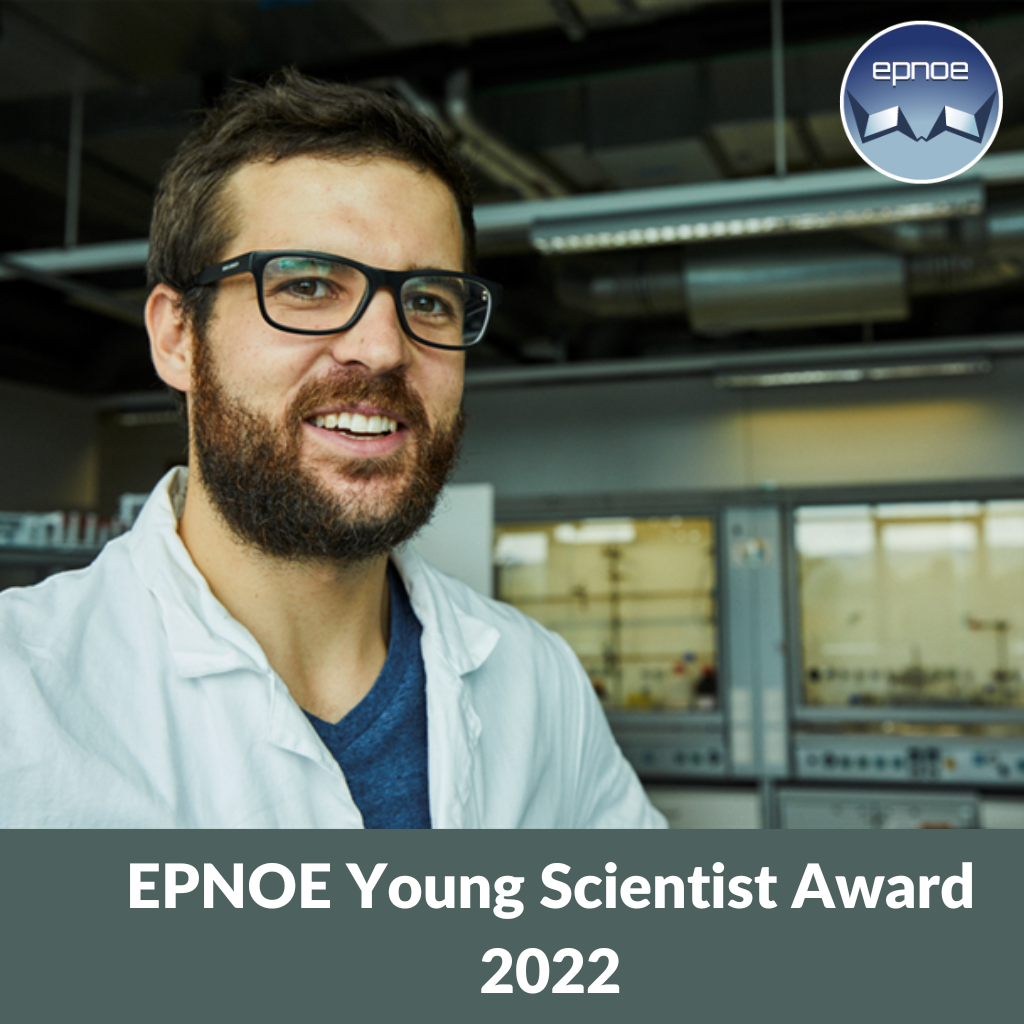
Marco Beaumont is the winner of the EPNOE Junior Award 2022. His work on spatioselective chemistry of nanocellulose presented during the EPNOE Junior Conference 2022 in Aveiro (Portugal), has been recognised internationally.
Marco is a junior group leader in the Institute of Chemistry of Renewable Resources, under the guidance of Prof. Thomas Rosenau and Prof. Antje Potthast. His research focuses on the development of sustainable and selective chemical strategies to modify bio-based Nanoparticles.
EPNOE is a partner of EU Horizon Projects
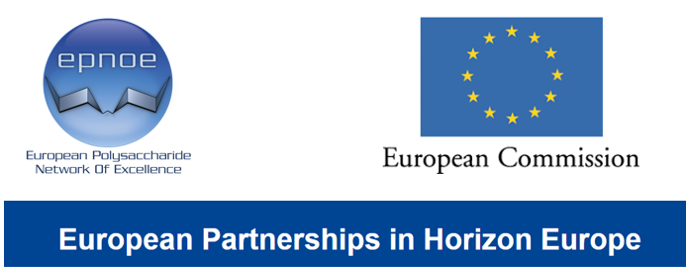
We are happy to announce that EPNOE is now registered to be a partner in EU Horizon projects!
We offer dissemination and communication support services for European research and technological development projects related to bio-based and circular economy, and polysaccharides related fields in materials science & engineering, food & nutrition and biomedical applications.
We are registered on the EU funding & tender portal as:
European Polysaccharide Network of Excellence
Click here for more details.
